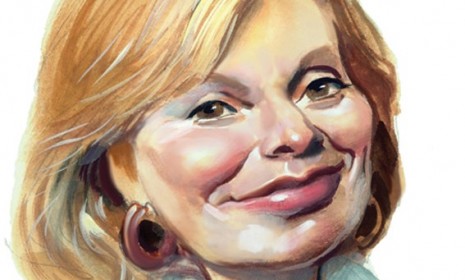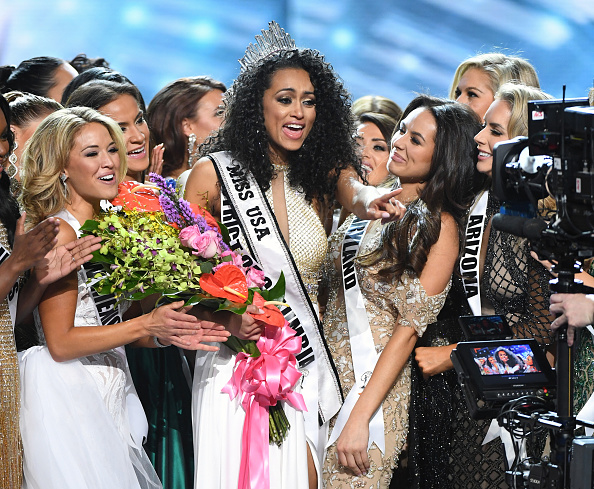Peggy Noonan: Columnist of The Year
Meet the winner of The Week's Columnist of the Year award

A free daily email with the biggest news stories of the day – and the best features from TheWeek.com
You are now subscribed
Your newsletter sign-up was successful
We are absolutely certain that Peggy Noonan is a conservative. Yet we’re never completely sure where she’s going to come down on a given issue. In an era of rigid polarization, she embraces the nearly lost art of openmindedness. It’s one reason her columns in The Wall Street Journal are so engaging. As the late Tim Russert once said of Noonan, “The only predictable thing about her column is its unpredictability.”
Which is not to say that Noonan pulls her punches. She is well-known as a harsh critic of George W. Bush and an even harsher critic of Hillary Clinton.Noonan’s prose is subtle and striking, and the clarity of her observations can be devastating. In advance of the State of the Union address, she wrote of the president, “As a rule, when Mr. Obama speaks, he literally says too many words, and they’re not especially interesting words. They’re dull and bureaucratic or windy and vague, too round and soft to pierce and enter your brain.”
Over the past year in particular, Noonan has done an admirable job of calling the political moment. She was prescient in describing the rise of the Tea Party and recognizing that it was “not a wing of the GOP but a critique of it.” Early in 2010, she predicted that the passage of Obama’s health care bill would be a “catastrophic victory” for the Democrats, but also warned that the midterm elections could be a catastrophic victory for the Republicans, if they seized back power without a clear purpose.
The Week
Escape your echo chamber. Get the facts behind the news, plus analysis from multiple perspectives.

Sign up for The Week's Free Newsletters
From our morning news briefing to a weekly Good News Newsletter, get the best of The Week delivered directly to your inbox.
From our morning news briefing to a weekly Good News Newsletter, get the best of The Week delivered directly to your inbox.
“Peggy Noonan is a rarity among political columnists,” says Tom Goldstein,a professor at the University of California at Berkeley and a judge for the Opinion Awards. “She is lucid,original, funny, and chatty. Most importantly,she arrives at her opinions after doing her own reporting.” Once a speechwriter for Ronald Reagan, Noonan is the best-selling author of seven books on American politics, history, and culture. Her essays have appeared in Forbes, TIME, Newsweek, The Washington Post, and The New York Times. She is a frequent guest on political talk shows. In both her columns and in her latest book, Patriotic Grace, she has written eloquently about how polarized our political debate has become. In the book, she makes a heartfelt plea for Americans to come together.
Noonan concedes that’s not likely to happen anytime soon. She recently wrote that she believes President Obama is likely to lose the 2012 election: “The overarching fact of Mr. Obama’s presidency is that he made a bad impression his first years in office and has never turned that impression around.” And given the rise of the Tea Party and the cast of characters already lining up for 2012, among them Donald Trump, Michele Bachmann, and Sarah Palin, it’s going to be a raucous contest. One thing we can count on: Noonan will be there to challenge — and surprise — us.
Read a Q and A with Peggy Noonan on the next page.
Q and A
A free daily email with the biggest news stories of the day – and the best features from TheWeek.com
Peggy Noonan usually likes to let her column speak for itself. But The Week’s pick for best columnist took time out to talk about partisanship, polarization — and, of course, Ronald Reagan.
Q: THE WEEK: You were quite tough on George W. Bush. But is it easier to be a conservative columnist with a
Democratic administration in power?
A: PEGGY NOONAN: No, it makes no difference. I came to be highly critical of President Bush’s thinking and decision making in 2005, at the beginning of his second administration. I remember that the pushback was hard, from both the White House and its apparatus. But I think it is my job to call it as I see it. That’s what columnists do, and must do, or their work won’t be any good. And you owe readers your best work. I mean this seriously. You’re privileged to have a public platform, and you have to come through.
Q: Do you consider yourself a partisan?
A: No, I am a writer and a conservative. I want the best thing for America, not for a party. I like to try to see what’s true and then try to say it. That for me is bliss. I think a lot about Edmund Burke because he respected reality and focused his work on trying to find what was true and real, then responding to it, either as a writer or political figure, which he was, in a responsible way. I feel free to write about my philosophical predispositions, and about those who’ve most shaped my political thinking, in part because I think it’s right to tell readers exactly where you’re coming from. I would actually like to see more of this in American public and journalistic life — more declaring not of a stand on specific positions but of why you hold a position, what’s behind it intellectually and philosophically. That’s actually often more interesting. I hate ideology, which is something forced down on people. I like philosophy, which springs up from people.
Q: Would you say you get more flak from people to the right or left of your positions?
A: It depends on what I’m writing about. When I started the weekly column in 2000, I was more criticized from the leftward side of the spectrum, then from 2005 more from the rightward. Now it sort of varies week to week. The previous generation of columnists had it great in this regard, and didn’t know it. Scotty Reston wouldn’t recognize the world columnists live in now. He’d write a column, go to lunch with a source, and then a few days later he’d get some mail from readers who sat down, wrote a letter, got an address and a stamp, and sent it on. He’d read it, maybe answer, maybe not. Now reaction to columns is immediate,public, and anonymous, and comes in great numbers. A columnist told me two years ago that his editors had urged him to answer his readers and he said, “I can answer my readers or write a column for you, take your pick.”
Q: There is a lot of talk about how polarized — and sometimes downright nasty — our political debate has become.
Has it had any effect on the types of positions you take, or changed how you think about your role as a
columnist?
A: No, I think you have to know the facts of the moments you live in and just forge ahead. I wrote a book,
Patriotic Grace, on how polarized things have become, and how unhelpful that polarization is. It’s been a
theme in my columns. But peace and amity haven’t broken out, so I think I should try harder.
Q: You wrote very eloquently about Ronald Reagan on the centennial of his birthday. Do you think he’d be
shocked by the level of partisanship today?
A: I don’t think so. He lived in a pretty tough time, with everyone throwing brickbats. Perhaps I don’t think human nature has changed — the Founders were pretty tough on each other, and politics and journalism have always
been full of fisticuffs. But technology both encourages expression and gives perhaps a false impression of the depth and breadth of political agitation. I suspect Reagan would be surprised most, in our age, by the death of privacy. That is a big thing to lose, and people have begun to relinquish it without knowing they’re giving up something precious.
Read the best of Peggy Noonan on the next page.
THE BEST OF NOONAN
Excerpts from The Wall Street Journal
What a blunder [health care] has been, win or lose, what a miscalculation on the part of the president. The administration misjudged the mood and the moment. Mr. Obama ran, won, was sworn in, and began his work under the spirit of 2008 — expansive, part dreamy and part hubristic. But as soon as he was inaugurated, the president ran into the spirit of 2009 — more dug in, more anxious, more bottom-line — and didn’t notice. At the exact moment the public was announcing it worried about jobs first and debt and deficits second, the administration decided to devote its first year to health care, which no one was talking about. The great recession changed everything, but not right away.
"The risk of catastrophic victory," Jan. 27, 2010
The biggest misunderstanding about Reagan’s political life is that he was inevitable. He was not. He had to fight for every inch, he had to make it happen. What Billy Herndon said of Abraham Lincoln was true of Reagan too: He had within him, always, a ceaseless little engine of ambition. He was good at not showing it, as was Lincoln, but it was there. He was knowingly in the greatness game, at least from 1976, when he tried to take down a sitting president of his own party.
"Ronald Reagan at 100," Feb. 4, 2011
The overwhelming fact the book [Game Change] communicates is that our candidates for president are emotionally volatile, extreme personalities. They spend a lot of time being enraged. They don’t trust those around them. They desperately want power and want to be celebrated, but they don’t know what they want to do with power beyond wield it, and they seem incapable of reflection about why they need to be admired. Most seriously, they show little interest in, or even awareness of, the central crises of their time.
"Road to the nut house," March 12, 2010
The Left doesn’t like [the Afghan] war and will only grow more opposed to it. The center sees that it has gone on longer than Vietnam, and “we’ve seen that movie before.” We’re in an economic crisis; can we afford this war? The Right is probably going to start to peel off, not Washington policy intellectuals but people on the ground in America. There are many reasons for this. Their sons and nephews have come back from repeat tours full of doubts as to the possibility of victory, “whatever that is,” as we all now say. There is the brute political fact that the war is now President Obama’s. The blindly partisan will be only too happy to let him stew in it.
"McChrystal forces us to focus," June 25, 2010
Youth is supposed to bring vigor and vision. In general, however, I think we find in our modern political figures that what it really brings is need — for greatness, to be transformative, to leave a legacy. Such clamorous needs! How very boring they are, how puny and small, but how huge in their consequences. What Mr. Obama needed the past 18 months was a wise man — more on that later — to offer counsel and perspective, a guy who just by walking into the room brings historical context. “Mr. President, the whole nation’s worried about this thing and you’re worried about that thing. They’re thinking money, and you’re thinking health care. Stop that, focus like a laser beam on the economy.” “My friend, you’re gonna get a win on this stimulus thing in the House, and you’re gonna do it without one Republican vote. That’s gonna make you feel good — flexing the muscle. But it’s gonna hurt you long-term.
You need bipartisan cover or people will think you’re radical. Whatever you gotta do to get some Republicans on board you do it, bow to what they need. Don’t worry about your left, where they gonna go? Left attacks you,
center’ll like you more.”
"Youth has outlived its usefulness," July 16, 2010
So far, the Tea Party is not a wing of the GOP but a critique of it. This was demonstrated in spectacular fashion when GOP operatives dismissed Tea Party–backed Christine O’Donnell in Delaware. The Republican establishment is “the reason we even have the Tea Party movement,” shot back columnist and Tea Party enthusiast Andrea Tantaros in the New York Daily News. It was the Bush administration that “ran up deficits” and gave us “open borders” and “Medicare Part D and busted budgets.”
"Why it’s time for the Tea Party," Sept. 17, 2010
-
 How the FCC’s ‘equal time’ rule works
How the FCC’s ‘equal time’ rule worksIn the Spotlight The law is at the heart of the Colbert-CBS conflict
-
 What is the endgame in the DHS shutdown?
What is the endgame in the DHS shutdown?Today’s Big Question Democrats want to rein in ICE’s immigration crackdown
-
 ‘Poor time management isn’t just an inconvenience’
‘Poor time management isn’t just an inconvenience’Instant Opinion Opinion, comment and editorials of the day
-
 Catriona Gray of the Philippines named Miss Universe
Catriona Gray of the Philippines named Miss UniverseSpeed Read
-
 Miss District of Columbia named 2017's Miss USA
Miss District of Columbia named 2017's Miss USASpeed Read
-
 Rumor becomes second German shepherd to win the Westminster dog show
Rumor becomes second German shepherd to win the Westminster dog showSpeed Read
-
Issue of the week: Yahoo’s ban on working from home
feature There’s a “painful irony” in Yahoo’s decision to make all its employees come to the office to work.
-
Issue of the week: Another big airline merger
feature The merger of American Airlines and US Airways will be the fourth between major U.S. airlines in five years.
-
Issue of the week: Feds’ fraud suit against S&P
feature The Justice Department charged S&P with defrauding investors by issuing mortgage security ratings it knew to be misleading.
-
Issue of the week: Why investors are worried about Apple
feature Some investors worry that the company lacks the “passion and innovation that made it so extraordinary for so long.”
-
Issue of the week: Does Google play fair?
feature The Federal Trade Commission cleared Google of accusations that it skews search results to its favor.